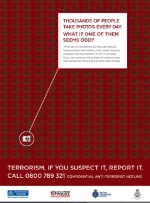Difference between revisions of "Anti-Terrorist Hotline"
(→Poster Campaign) |
(→Internet Website Hits) |
||
| (8 intermediate revisions by 2 users not shown) | |||
| Line 1: | Line 1: | ||
| − | The Anti-Terrorist hotline is a dedicated 24 hour telephone service | + | The Anti-Terrorist hotline is a dedicated 24-hour telephone service staffed by specialist counter-terrorism police officers for members of the public who want to report terrorist activity or suspicious behaviour. <ref name="Special Ops">[http://www.met.police.uk/so/at_hotline.htm Specialist Operations], ''Metropolitan Police Service,'' accessed 11.08.10</ref> |
| − | The public are advised by the Police to trust their "instincts" and not judge whether something is suspicious | + | The public are advised by the Police to trust their "instincts" and not judge whether or not something is suspicious - instead they should let trained officers decide.<ref name="Special Ops"/> |
The slogan of the anti-terrorist hotline is: "If you suspect it, Report it". | The slogan of the anti-terrorist hotline is: "If you suspect it, Report it". | ||
| Line 12: | Line 12: | ||
In 2008, the [[Metropolitan Police Service]], Greater Manchester Police, West Yorkshire and the West Midlands Police launched an intensive radio and [[2008 Counter-Terrorism advertising campaign|poster campaign to promote the anti-terrorist hotline]]. | In 2008, the [[Metropolitan Police Service]], Greater Manchester Police, West Yorkshire and the West Midlands Police launched an intensive radio and [[2008 Counter-Terrorism advertising campaign|poster campaign to promote the anti-terrorist hotline]]. | ||
| − | Soon after, the posters became the subject of criticism for playing on peoples fears and promoting a surveillance culture.<ref>Jeremy Kuper, [http://www.guardian.co.uk/commentisfree/2009/apr/03/security-terrorism Join the Snooper Troopers], ''the Guardian'', 6 April 2009, accessed 11.08.10</ref> | + | Soon after, the posters became the subject of criticism for playing on peoples' fears and promoting a surveillance culture.<ref>Jeremy Kuper, [http://www.guardian.co.uk/commentisfree/2009/apr/03/security-terrorism Join the Snooper Troopers], ''the Guardian'', 6 April 2009, accessed 11.08.10</ref> |
| − | In August 2010, the Advertising Standards Agency (ASA) banned an advert | + | In August 2010, the Advertising Standards Agency (ASA) banned an advert aired on the Talksport Radio channel after 18 individuals filed separate complaints on the basis that the advert promoted the harassment of innocent people and played on peoples' fears."<ref>[http://www.asa.org.uk/Complaints-and-ASA-action/Adjudications/2010/8/The-Association-of-Chief-Police-Officers/TF_ADJ_48887.aspx ASA Adjudication on The Association of Chief Police Officers], ''Advertising Standards Agency'', 11 August 2010, accessed 11.10.08</ref> |
| + | |||
| + | ==No. of Telephone Calls== | ||
| + | |||
| + | During the poster campaign of 2007 (January - April), there were the following number of calls:<ref name="Poster Campaign">See Appendix 1, [http://www.mpa.gov.uk/committees/mpa/2007/070628-agm/09/ MPS response to the MPA report 'Counter Terrorism: the London Debate'], ‘‘Metropolitan Police Authority’’, Report 9, 28 June 2007, produced by the Commissioner, accessed 13.08.10</ref> | ||
| + | |||
| + | *'''January:''' 318 calls | ||
| + | *'''February:''' 280 calls | ||
| + | *'''March:''' 681 calls | ||
| + | *'''April:''' 346 calls | ||
| + | |||
| + | ===Internet Website Hits=== | ||
| + | |||
| + | The Anti-Terrorist Hotline pages on the [[Metropolitan Police Service]] website had 2,101 hits in March 2007. This increased to 11,306 in April 2007. The Greater Manchester Police website registered 328 visitors in March 2007 to its relevant Counter-terrorism pages. For April 2007, when the campaign was no longer running, it decreased to 112 visitors. There was also a slight increase in the number of visitors to the West Yorkshire and West Midlands CT pages.<ref name="Poster Campaign"/> | ||
==Notes== | ==Notes== | ||
Latest revision as of 02:53, 14 August 2010
The Anti-Terrorist hotline is a dedicated 24-hour telephone service staffed by specialist counter-terrorism police officers for members of the public who want to report terrorist activity or suspicious behaviour. [1]
The public are advised by the Police to trust their "instincts" and not judge whether or not something is suspicious - instead they should let trained officers decide.[1]
The slogan of the anti-terrorist hotline is: "If you suspect it, Report it".

This article is part of the Counter-Terrorism Portal project of Spinwatch. |
Poster Campaign
In 2008, the Metropolitan Police Service, Greater Manchester Police, West Yorkshire and the West Midlands Police launched an intensive radio and poster campaign to promote the anti-terrorist hotline.
Soon after, the posters became the subject of criticism for playing on peoples' fears and promoting a surveillance culture.[2]
In August 2010, the Advertising Standards Agency (ASA) banned an advert aired on the Talksport Radio channel after 18 individuals filed separate complaints on the basis that the advert promoted the harassment of innocent people and played on peoples' fears."[3]
No. of Telephone Calls
During the poster campaign of 2007 (January - April), there were the following number of calls:[4]
- January: 318 calls
- February: 280 calls
- March: 681 calls
- April: 346 calls
Internet Website Hits
The Anti-Terrorist Hotline pages on the Metropolitan Police Service website had 2,101 hits in March 2007. This increased to 11,306 in April 2007. The Greater Manchester Police website registered 328 visitors in March 2007 to its relevant Counter-terrorism pages. For April 2007, when the campaign was no longer running, it decreased to 112 visitors. There was also a slight increase in the number of visitors to the West Yorkshire and West Midlands CT pages.[4]
Notes
- ↑ 1.0 1.1 Specialist Operations, Metropolitan Police Service, accessed 11.08.10
- ↑ Jeremy Kuper, Join the Snooper Troopers, the Guardian, 6 April 2009, accessed 11.08.10
- ↑ ASA Adjudication on The Association of Chief Police Officers, Advertising Standards Agency, 11 August 2010, accessed 11.10.08
- ↑ 4.0 4.1 See Appendix 1, MPS response to the MPA report 'Counter Terrorism: the London Debate', ‘‘Metropolitan Police Authority’’, Report 9, 28 June 2007, produced by the Commissioner, accessed 13.08.10
